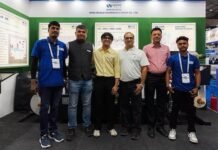In 1987, when Huhtamaki PPL’s current chairman Suresh Gupta joined the company (known as Paper Products Limited at the time), the total sales were less than Rs. 100 crore. In the three decades since his joining, the company has recorded exponential growth to reach a level where HPPL now clocks an annual revenue of Rs. 2,200 crore (over EUR 290 million) and is one the largest manufacturers by volume of finished flexible packaging in the larger Africa, India and Asia Pacific region. A true pioneer, the company has set numerous industry standards in technical excellence, innovation and corporate governance.
“The company has been a very important part of the indigenous manufacturing movement in India. We kept the philosophy of bringing the best packaging to the country. It is pertinent for industry leaders to set standards,” says Gupta. “Being a Rs. 2,200-crore company means that we are responsible for safe delivery of nearly Rs. 40,000 crore worth of products.”
Since 1989, HPPL has been on a huge and continuous modernization drive. The company currently has 16 state-of-the-art plants across India with some of the best printing and converting equipment installed. HPPL offers a diverse range of packaging solutions in flexible packaging, including a variety of pouching solutions, labels, shrink sleeves and holographic and security solutions.
In mid-1999, HPPL became a member of the Finland-based consumer packaging group Huhtamaki Packaging Worldwide. In recent years, HPPL has acquired stakes in a variety of India-based packaging solution providers, including the 51% stake it acquired in Webtech in 2012, a leading manufacturer of labels for the pharmaceuticals sector. In January 2015, it acquired Positive Packaging Industries Ltd. in its entirety.
Sustainability
Cleanliness, environment and sustainability are areas that Gupta is passionate about and the sight of Indian streets littered with packaging waste depresses him. Although he feels that every stakeholder— the public, industry and the government — is responsible for this, the biggest blame according to him goes to local government. “Packaging waste needs to be recycled or reused and all this needs proper collection, which depends on local governments. Sadly, the local leadership is not conscious about this problem,” he laments.
Not only as the chairman of HPPL but also as the president of Indian Flexible Packaging & Folding Carton Manufacturers Association (IFCA), Gupta is continuously interacting with the packaging industry and even HPPL customers and urges them to step up to the issue of sustainability. HPPL as a company makes it a point that whatever waste it generates in its factories is being used purposefully. The waste is shredded and given to entities that can reuse it.
Safety is another core issue. Safety, not only of its employees at the plant, but also of the public that consumes HPPL’s packaging. “We insist that our suppliers meet our standards. Polyester film suppliers, ink suppliers and adhesive suppliers, all have to meet the highest level of safety standards,” Gupta shares.
NASP program
Innovation is something which Gupta believes has played a vital role in the growth of HPPL over the decades. To ensure that the company continuously churns out new and innovative packaging solutions, it has implemented a program called NASP (New Applications, Structures and Products/Processes). “HPPL records sales generated from this program on a yearly basis and the target is to keep it above 25% of the total sales,” Gupta says.
Acquisition, expansion and growth
In the past half a decade or so, HPPL has acquired Webtech and Positive Packaging, driven by its desire to fill the gaps in its overall operations. One of the largest labelling companies in India, an area where it needed some expertise was in the pharmaceutical labels segment. Given that Webtech was a leading player in pharmaceutical labels, it made sense for HPPL to bring it within its fold.
“The speed of the industry is such that you need to keep up, even if you are among the best in the industry. If that can be done by acquiring a company, it archives the purpose,” says Gupta.
While Webtech offered HPPL the expertise in pharmaceutical labelling segment, Positive Packaging was a good fit as HPPL and Positive did not have much overlap in terms of technology and the two complemented each other. Gupta adds that HPPL continues to look at and evaluate acquisition targets – and if demonetization and GST had not happened, the company would have announced something new this year as well.
Even in terms of HPPL’s geographical reach, Gupta argues, there is still a long way to go despite the company having 16 plants across the country. “India is a vast country and we still have a lot to cover,” he says.
Growth to bounce back next year
The Indian economy saw two unprecedented shocks within a one-year span in the form of demonetization and GST. The FMCG sector was severely impacted and, according to Gupta, is still running significantly behind its growth targets for the year.
However, in the next year he expects growth of about 15%, mainly because of this year’s abysmally low base. Commenting on the broader trend in the economy and the FMCG space, he says that Indian consumers now have a strong aspirational value, and this will continue to propel demand for packaging.
In terms of innovation in packaging, he feels that smaller companies or start-ups are now the major drivers in this sphere. Citing an example of the Indian sweets and snacks segment, Gupta says that local brands in this space are now competing fiercely with multinationals as they are doing very well in modernizing their packaging. “Packaging is now revolutionizing the Indian snack and sweets segment,” he says.











